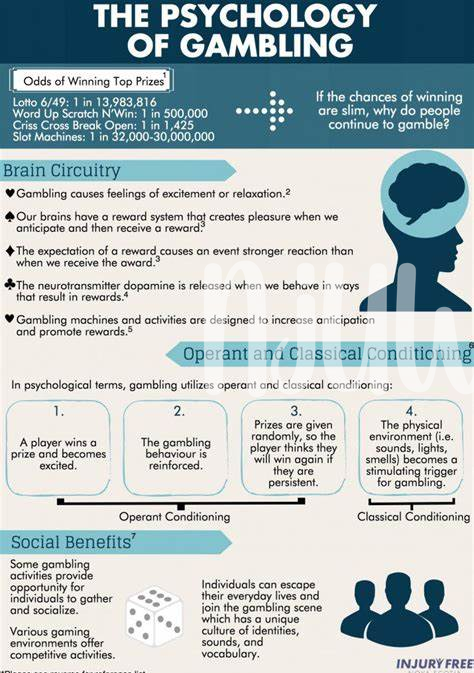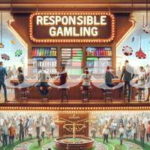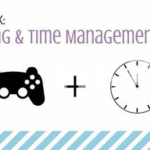Unpack the Complexities of Gambling and Risk Psychology, Delving into What Drives Individuals to Stake Their Bets. Discover Key Insights and Theories in This Enlightening Exploration.
The Science Behind Risk-taking in Gambling
- 🧠 Understanding the Psychology of Gambling and Risk
- 📈 Deciphering the Odds: the Math of Gambling
- 🎰 the Role of Dopamine in Reward and Risk-taking
- 🤔 Cognitive Biases: Why We Overestimate Winning Chances
- 🛑 the Thin Line: Healthy Enthusiasm Vs. Problem Gambling
- 💡 Strategies to Mitigate Risks While Enjoying Gambling
🧠 Understanding the Psychology of Gambling and Risk
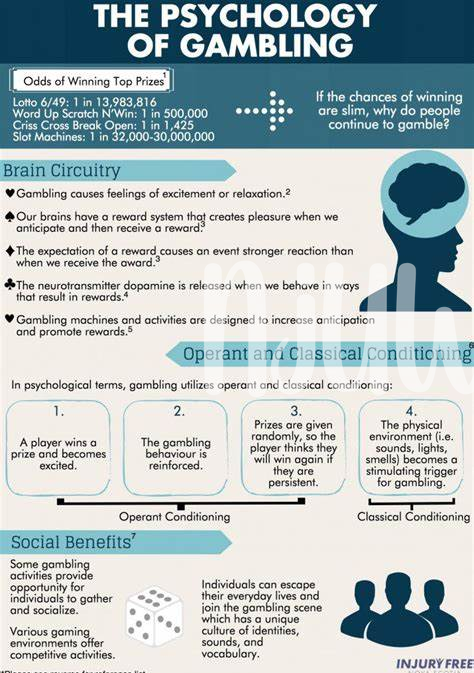
Venturing into the realm of gambling, individuals often find themselves at the crossroads of thrill and caution, navigating through an intricate dance of decision-making and emotion. At the heart of this experience lies a complex psychological journey, one that beckons a deeper understanding of what propels us towards risk. The human mind, with its myriad of cognitive processes, plays a pivotal role in this scenario, where the allure of potential gains often overshadows the rational evaluation of odds. This precarious balance between risk and reward is not just a matter of chance but a psychological battleground where every decision is influenced by a myriad of factors, from the promise of a win to the fear of loss.
Diving deeper, it becomes evident that the psychology of gambling is much more than a game of luck; it’s a reflection of human nature itself. The thrills of the ‘gamble’ tap into our innate desire to achieve, often pushing us to tread on the edge of risk. However, this adventure into the unknown isn’t without its pitfalls. Cognitive biases, such as the illusion of control, often lead us to overestimate our chances of winning, making it all too easy to ignore the harsh mathematics of gambling. Yet, within this entangled web of risk and desire, there exists the potential for understanding – a way to demystify the psychological forces at play. By acknowledging these underlying principles, one can begin to navigate the gambling world with a more informed perspective, mitigating risks while still indulging in the excitement it offers.
| Aspect | Description |
|---|---|
| Risk and Reward | The balance between the potential gain and the potential loss involved in gambling. |
| Cognitive Biases | Psychological tendencies that cause the human brain to draw incorrect conclusions. |
| Innate Desires | The fundamental human inclination towards achieving success and overcoming challenges. |
The fascination with gambling stretches far beyond the flicker of neon lights or the clinking of coins; it beckons a closer look into our psyche, revealing much about our perceptions of success and failure. Steering through this landscape requires not just luck but a keen awareness of one’s own mental frameworks, making the journey as much about discovering oneself as it is about chasing the thrill of the bet.
📈 Deciphering the Odds: the Math of Gambling
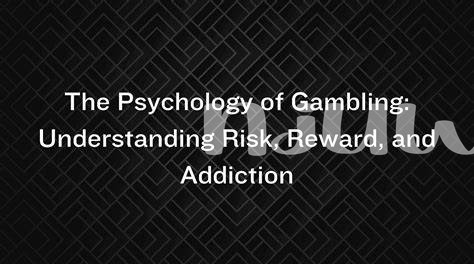
At the heart of every roll of the dice, spin of the wheel, or shuffle of cards, there lies a complex interplay of mathematics that governs the outcome. This intricate dance between chance and strategy molds the foundation of gambling and risk psychology, challenging players to navigate a labyrinth of probabilities. Understanding the math behind gambling isn’t just about recognizing the house edge or calculating odds; it’s about decrypting a hidden language that speaks volumes about the potential for wins and losses. It turns what often seems like a game of luck into a puzzle requiring both skill and intuition.
Diving deeper, the math of gambling introduces a form of Darwinism in decision-making, where only the savviest of players, those who can decode the variance and understand the long-term expectations, thrive. Despite the allure of a quick win, the principles of probability unequivocally predict a different story—one where the house often comes out on top. For instance, the concept of ‘expected value’ can be a sobering lesson, revealing that each bet carries an inherently negative outcome over time for the player, a stark revelation for anyone enthralled by the rush of the game.
Yet, gambling persists, fueled by human nature’s intrinsic attraction to risk and reward—a principle mirrored in the burst of dopamine experienced with each near-miss or win. This biological reaction is not just a byproduct of luck; it’s a calculated response to the anticipation of reward, meticulously engineered through the odds of the game. The cognitive biases that cloud our judgement, leading us to overestimate our chances of winning, only complicate the landscape further, turning gambling into a masterclass in psychology as much as it is in mathematics.
To navigate this complex web, players must arm themselves with knowledge and discipline. Setting limits, understanding the long haul over the immediate, and recognizing the signs of problem gambling are strategies that can help maintain the balance between the thrill of the gamble and the harsh mathematics of reality. Such prudence might not guarantee a win, but it definately safeguards the player from the fallout of a loss, ensuring that the pursuit of risk remains a form of entertainment, rather than a slide into financial distress. This equilibrium between analysis and allure is the essence of gambling’s enduring fascination, weaving together the fibres of chance, skill, and psychology into a tapestry rich with human experience.
🎰 the Role of Dopamine in Reward and Risk-taking
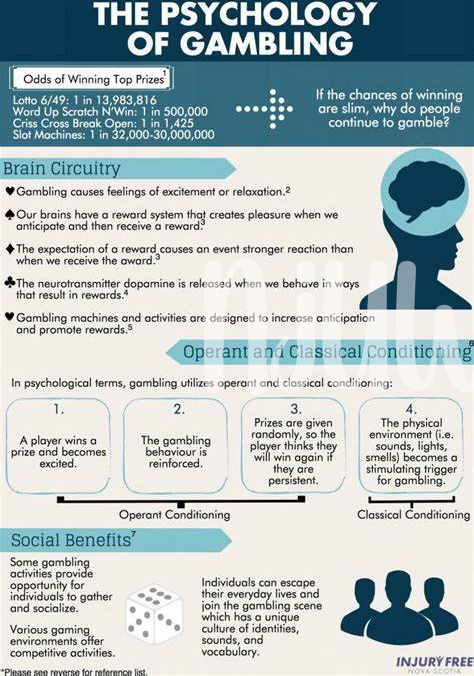
Diving into the intricate world of gambling and risk psychology reveals the crucial role of dopamine, our body’s natural reward chemical. When we place a bet or take a risk, and then experience a win, our brain releases dopamine, leading to feelings of pleasure and satisfaction. This biochemical reaction is hardwired into us, pushing individuals to seek out these rewarding experiences repeatedly. It’s akin to being given a vial of happiness, one that we’re constantly seeking to refill through the next gamble or risk, regardless of the rational odds against winning.
However, this search for the dopamine rush can lead individuals down a path where rational decision-making takes a back seat to the euphoria of possible rewards. Cognitive biases, coupled with the brain’s reward system, can lead gamblers to overestimate their chances of winning, persisting in behaviours even in the face of recurring losses. The ‘happy pills’ of our brain’s making often blur the line between optimistic risk-taking and problematic gambling. It’s a tricky balance, maintaining enthusiasm for the game while not falling prey to the pitfalls of addiction. Recognising the signs of problem gambling early is crucial, akin to having a script for wellness rather than waiting untill the issue escalates.
Strategies for mitigating the risks associated with gambling hinge on understanding and managing this dopamine-driven pursuit of reward. Setting boundaries, knowing when to stop, and recognising the value of small wins can help maintain a healthier relationship with gambling. The phenomenon is not solely about the financial risk but understanding the psychological underpinnings that drive us towards these behaviours. It’s about flipping the script, transforming gambling from a compulsion into an occasion for measured excitement and entertainment, always within the realms of what’s safe and sensible.
🤔 Cognitive Biases: Why We Overestimate Winning Chances
In the realm of gambling and risk psychology, our brains often play tricks that make us prone to overestimating our chances of winning. This phenomenon can largely be attributed to cognitive biases, subtle mind games that shape our perception and decision-making. One such bias is the illusion of control, where individuals believe they can influence the outcome of a game of chance, leading them to take risks they might not otherwise consider. Another culprit is the gambler’s fallacy, the belief that if something happens more frequently than normal during a given period, it will happen less frequently in the future, or vice versa. This misconception can cause people to make decisions based on past outcomes, rather than understanding each spin of the roulette wheel or roll of the dice is independent of the last.
Additionally, the near-miss effect, which acts like a “magic mouthwash” for the gambler’s psyche, convinces players they were ‘close’ to winning, spurring them on to try again. This, partnered with “happy pills” – the euphoria from the wins, however small and infrequent they may be – creates a cycle that can be hard to break. The complexity of these psychological undercurrents, compounded by the allure of the jackpot, ensnares the gambler into believing victory is just around the corner, often leading to misleading optimism about winning odds. Without recognizing and combatting these biases, players can easily fall into patterns of problematic gambling, driven by distorted beliefs fueled by cognitive inaccuracies.
🛑 the Thin Line: Healthy Enthusiasm Vs. Problem Gambling
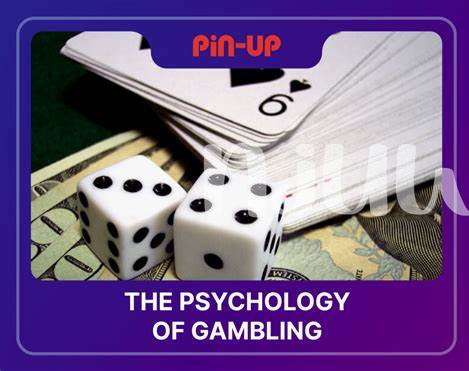
Navigating the dynamic landscape of gambling necessitates a deep understanding of the thin margin between passion and compulsion. At its core, gambling lights up the brain’s reward circuits, akin to the effect elicited by receiving a compliment or achieving a challenging goal. This exhilaration is both the allure and the achilles heel of gambling. It’s vital, therefore, to recognise when the scales tip from healthy enthusiasm to an unhealthy obsession, which can have profound implications on an individual’s mental and physical wellbeing as well as their social and financial status.
The psychology of gambling and risk is multifaceted, weaving through the realms of thrill-seeking and the human inclination to push boundaries. However, when gambling transitions from a leisure activity to a compulsive need, it’s akin to the difference between enjoying a casual drink and crossing into the territory of substance dependency. Identifying this shift early on is crucial, as problem gambling often masquerates as harmless fun untill it’s too late. Symptoms to watch out for include spending more time and money on gambling than intended, chasing losses, and gambling in secret.
| Healthy Enthusiasm | Problem Gambling |
|---|---|
| Set limits on time and money spent gambling | Continuously chasing losses |
| Views gambling as a form of entertainment, not a source of income | Relies on gambling as a significant way to make money |
| Gambles with friends or family for socialisation | Gambles in isolation and lies about gambling activities |
| Stops when the set limit is reached | Unable to stop despite serious consequences |
Strategies to mitigate such risks include establishing firm boundaries for yourself. This might involve setting strict limits on how much time and money you’re willing to spend, recognising when it’s time to stop, and understanding the odds are always against you in the long run – a crucial piece of knowledge that can demystify the allure of ‘the big win’. Remember, gambling should be a sprinkle of excitement, not the main course of your day. Engaging in other hobbies, seeking support from groups like Gamblers Anonymous, or consulting professionals for gambling and risk pyschology can provide alternative pathways to manage this delicate balance.
💡 Strategies to Mitigate Risks While Enjoying Gambling
Engaging in gambling can be a thrilling pastime, yet navigating the waters of chance without losing sight of the shore requires a balanced approach. Key to this is understanding and embodying responsible gambling, a concept that seeks to keep the excitement alive without steering into the stormy seas of problem gambling. Firstly, establishing a hard limit on how much one can afford to lose, often referred to as a “loss limit,” is crucial. This acts as a safety net, ensuring that the thrill of the bet doesn’t lead to financial distress. Equally important is the concept of a “windfall,” which, unlike the often misunderstood term “Fridge Drugs” – not a medication, but here symbolizing an unexpected gain – should be seen as a moment of luck rather than a guaranteed outcome.
Moreover, time management plays a pivotal role in keeping the gambling experiance enjoyable and under control. It’s easy to lose track of time amidst the neon lights and the clamour of slot machines, hence setting a clear time limit for gambling activities is advisable. This not only prevents the hobby from encroaching on daily responsibilities but also mitigates the risk of descending into “Pharmageddon” – a term denoting chaos, in this context representing the potential turmoil unchecked gambling habits can create in one’s life. Engaging in periodic self-assessment can further help gamblers stay on track, ensuring their hobby remains a source of joy rather than a cause for concern. By adopting these strategies, individuals can enjoy the whirlwind of gambling while staying anchored by the principles of responsible play, ensuring that the thrill of the game remains just that – a thrilling experiance.
